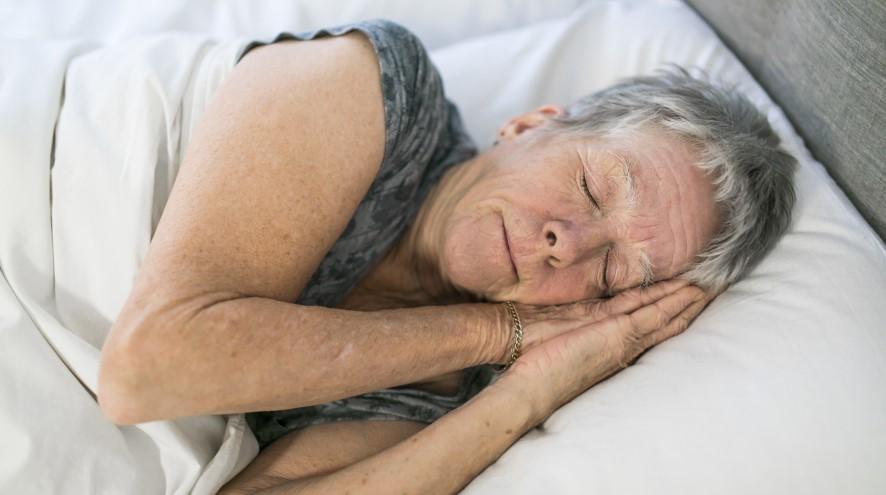Sleep
Sleep disturbances are common with Alzheimer’s disease and they impact both the person with the disease and the caregiver.

Download our full brochure: When sleep becomes an issue: tips and strategies.
Overview
Sleep disturbances are common with Alzheimer’s disease and they impact both the person with the disease and the caregiver. While older adults without the disease may experience changes in their sleep patterns, they tend to be more severe in someone with the disease.
Types of sleep disturbances
Someone with dementia may have difficulty staying asleep at night. They may wake more frequently than normal and also have more difficulty falling back to sleep. When awake, they may wander, be restless or call out, which disrupts the caregiver’s sleep as well.
They may also sleep during the day, and, as this gets worse, they may eventually be unable to sleep at night. In extreme situations, they may reverse his sleep patterns, sleeping most of the day and being awake most of the night. This leads to a period of great restlessness and agitation in the late afternoon or early evening, often called “sundowning.”
Other factors that may worsen the problem
In addition to the typical sleep disturbances, other medical problems can make sleeping worse.
- The person living with dementia may have depression, which can have associated sleep disturbances.
- Restless leg syndrome can also keep them up at night, when the symptoms seem to be worst.
- Sleep apnea, which causes an abnormal breathing pattern, can also disturb sleep.
- Some medications for Alzheimer's disease can cause insomnia or sleep disruptions, such as donepezil (Aricept™) and memantine (Ebixa®), particularly when taken at certain times of day
Consult a doctor for these conditions, as treatments are available that may alleviate them. In terms of medications that can cause sleep disruptions, some experts recommend changing timing of taking medication to morning to reduce such side effects. Always make sure to discuss what medication and dosage timing is best for you with your doctor and/or pharmacist.
Treatment for sleep disturbances
Treatment for sleep disturbances include both medication and non-medication approaches. Sleep disturbances can be one of the most difficult aspects of dementia. Caregivers must also get enough sleep. Try some of the non-medication approaches listed below, or talk to your doctor regarding medication approaches.
Non-medication approaches
Non-medication approaches include getting regular exercise (but not just before going to bed) and avoiding alcohol, caffeinated drinks, and nicotine. Make sure the bedroom is a comfortable temperature, and provide security objects and nightlights if needed. (But too much light can make it harder to sleep.)
Move daytime clothing out of sight, so that it doesn’t act as a trigger to get dressed. It’s a good idea to aim for regular meal times, bedtimes and wakeup times. Try a light snack before bed, including herbal tea or warm milk. Make sure the person living with dementia has any pain medication, if necessary. Before bedtime, the person should avoid other medications that might keep them awake, such as any cholinesterase inhibitors (tacrine, donepezil, rivastigmine or galantamine).
If they does wake up at night, encourage her to get out of bed and do something quiet like read or listen to relaxing music. Discourage doing anything stimulating such as watching television. Try to stay calm and avoid arguing. Remember, she is not intentionally staying awake. If you can, gently guide her back to bed.
Medication approaches
Medications are not considered to be a long-term solution, as they do not appear to improve sleep quality for older adults. Long-term use can also increase the chance of falls and other risks.
If non-medication methods don’t work, you may want to ask a doctor about medication for sleep. Keep in mind that sleep medication for people with cognitive impairments such as dementia comes with risks, including risk of falls, increased confusion and a decline in independence. Try to discontinue sleep medication once a more regular sleep pattern returns.
Ask your doctor about the types of medications available to help a person living with dementia sleep. Depending on the other types of behaviours they have, the doctor may prescribe different types of drugs.
If the person is prescribed a medication, ask questions to understand what to expect. Find out the benefits and risks of the medication, as well as any other options.
More information and resources
- Sleep Matters When Someone has Dementia. Department of Occupational Therapy, Faculty of Rehabilitation Medicine, University of Alberta, October 2016. A webinar on the relationship between sleep, the environment and dementia, including tips to make your bedroom environment more conducive to sleep.
- Sleepwell. A website describing effective, non-medication approaches to managing insomnia.
- Sleep and Dementia: A report on the evidence-base for nonpharmacological sleep interventions for person with dementia. Department of Occupational Therapy, Faculty of Rehabilitation Medicine, University of Alberta, February 2011. On pages six and seven of this report, you can find recommendations that may help family members living with dementia to have a better sleep. These recommendations are grouped by whether the evidence in support of these interventions are well-researched, adequate or in need of more study.
- Preventing and managing sleep disturbance. Bendigo Health. This webpage provides some recommended approaches and responses that caregivers and healthcare providers can use to help people living with dementia sleep soundly, including a flow chart for specific strategies to manage sleep disturbance.
- Caregiver Training: Sleep Disturbances. UCLA Alzheimer's and Dementia Care Program, February 2018. This short video provides people living with dementia and caregivers with practical tools to help create a safe, comfortable environment for sleep.
Last updated: May 12, 2023
